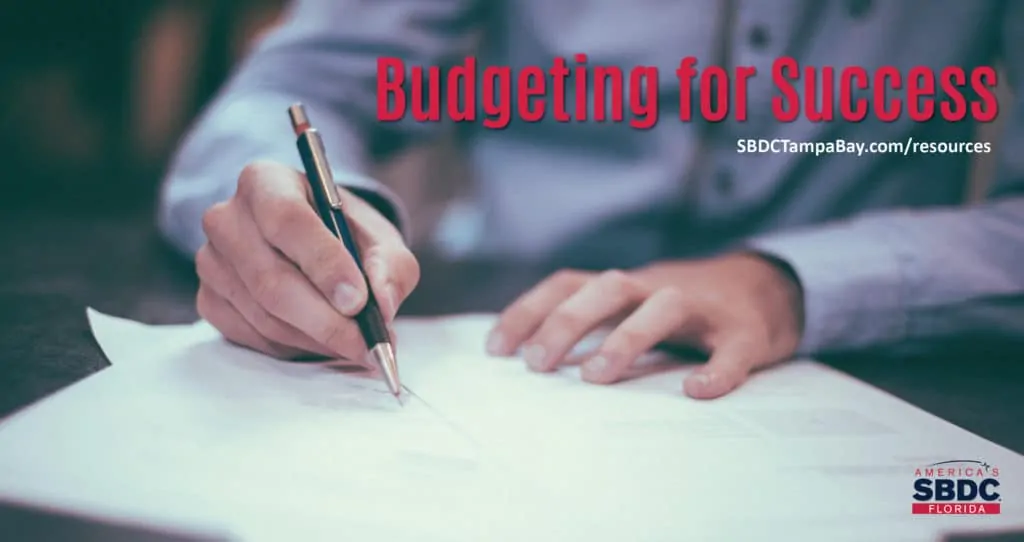Budgeting Your Small Business for Success
by Corey McCaster | February 19, 2020
It is easy for a business owner to get caught up in the day-to-day minutiae of owning a business. Between bills, staffing issues and creating effective marketing strategies to appeal to the masses, some may find themselves living each business day just trying to make it to the next.
In order to become successful, one of the most important — but often overlooked — tasks for a business owner is to invest the time in creating an annual budget. Running a business without a budget is almost like driving a car without a steering wheel. It is the most effective way for a business to stay on track. Oftentimes the business owner views creating an annual budget as an arduous task and can rarely see the value until they implement it.
Clear Assessment
Creating a structured budget allows the owner to get a clear view of expenses, cash needs and expected income, allowing them to regularly monitor performance, improve profits and increase return on investments. This allows the owner to get a clear understanding of how much time and resources are needed for sales, marketing, outreach, etc.
Disregarding Personal Income
Often, business owners do not budget their own salary. This gives a false sense of profits at the end of the year. For example, the company is projected to have sales of $100,000. However, the owner didn’t put in the budget the $50,000 they needed for personal expenses throughout the year. Including the owner’s salary in the annual budget allows for a realistic picture of what to expect.
Unplanned Expenses
There are many expenses and situations that can pop up throughout the year that could send a business into a tailspin. Creating an annual budget allows the business owner to be proactive instead of reactive when these situations inevitably occur. Being reactive could cause a cash flow nightmare because they don’t have a clear understanding of what their true needs are for the future.
Profit Picture
Without a clear annual budget, it could be hard for the unprepared business owner to know what to do at the end of the year if they see a profit. Actually, without a comprehensive budget, the business owner may not even notice that the business has even made a profit. Creating an effective annual budget includes creating a budget of what to do with the profits. Though it may be easy to pocket the profits, investing in things like employee retention and enhancements in technology or structure will allow the company to grow and increase profits in the years to come.
Building Comradery
Depending on the size of the company, the process could be a bit overwhelming. Allowing the employees to contribute not only helps with the burden, but it also gives employees a sense of value. Allow the various department heads to create a budget for their department, then come together and show them how each department is essential to the bigger picture. This allows everyone to operate on the same page and develop a mutual respect for each other’s contributions to the company.
There are many positives to creating an annual budget. It is ideal to start planning in the beginning of the last quarter of the fiscal year so you can take into consideration earnings, hard costs and unexpected costs. Items that should be included in your budget are:
- Financial performance and forecasts
- Key objectives & business goals
- Key performance indicators
- Potential industry changes (including market, clients and competition)
- Staffing changes
- Personal investment and salary
Success is dependent on planning for the future. When the inevitable crisis or unexpected burst of success approaches, having a plan of action set in place will allow you to be better prepared to conquer any situation.






Corey J. McCaster
Consultants, McCaster, PinellasFlorida SBDC at USF, Pinellas County
Specialty: Business Planning, Financial Analysis, Marketing and Sales, Loan Packaging, Strategic Planning
Corey McCaster brings more than 20 years of experience to the Tampa Bay small business community. McCaster specializes in small business accounting and finance, quality improvement and strategic business planning. His experience while “in the trenches” managing his own small businesses, and serving in Tallahassee at the Florida Department of Economic Opportunity, allows him to deliver a unique perspective and a wealth of knowledge to clients. McCaster is charged with helping small to medium sized existing businesses find new market opportunities, hidden profits and innovative ways to create sustainable growth, which includes hiring the right employees. His background in workforce development assists him in guiding business owners in attracting and retaining top talent. McCaster is a University of South Florida business school graduate and holds certifications in both project management and workforce development.